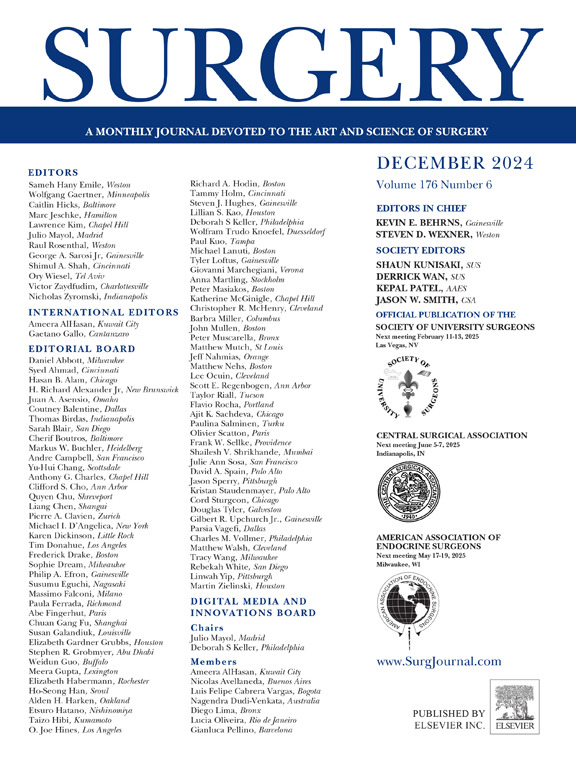心血管手术后需要手术干预的胃肠道并发症:院内死亡率的预测因素
IF 3.2
2区 医学
Q1 SURGERY
引用次数: 0
摘要
背景:心血管手术后出现需要手术干预的胃肠道并发症导致院内死亡率的风险因素尚未被描述:方法:纳入了 2010 年 1 月至 2023 年 6 月间在同一次入院中接受心血管手术后又接受胃肠道手术的成人患者。采用多变量逻辑回归确定院内死亡率的预测因素。根据已确定的风险因素进行卡普兰-梅耶生存分析,以评估总生存率:结果:151例患者在心脏手术后出现了需要手术干预的胃肠道并发症,院内总死亡率为35.76%(n = 54)。最常见的诊断是肠缺血(50.33%)。在多变量逻辑回归中,肝硬化病史(几率比:37.96,95% 置信区间:3.57-543.90)和普外科急诊就诊时的临床状况,即乳酸升高(几率比:5.76,95% 置信区间:1.71-22.82)、血小板 9/L(几率比:11.34,95% 置信区间:1.60-162.37)、≥3 种血管活性药物(几率比:4.93,95% 置信区间:1.29-20.14)和需要肾脏替代治疗(几率比:5.18,95% 置信区间:1.46-20.79)是院内死亡率的预测因素。当多变量分析中确定的风险因素均不存在时,院内死亡率较低(2.38%,42 例中有 1 例),但有 4-5 个风险因素的患者院内死亡率普遍较高(100%,8 例中有 8 例):结论:当患者病情严重时,心脏手术后的胃肠道并发症是灾难性的。临床医生应对胃肠道并发症保持高度怀疑,以促进普外科的早期介入。了解这些风险因素有助于指导多学科护理团队、患者及其家属之间的讨论。本文章由计算机程序翻译,如有差异,请以英文原文为准。
Gastrointestinal complications requiring operative intervention after cardiovascular surgery: Predictors of in-hospital mortality
Background
Risk factors for in-hospital mortality related to gastrointestinal complications requiring operative intervention after cardiovascular surgery have not been previously described.
Methods
Adult patients who underwent cardiovascular surgery followed by gastrointestinal surgery during the same admission between January 2010 and June 2023 were included. Multivariable logistic regression was used to identify predictors of in-hospital mortality. Kaplan-Meier survival analysis was performed to assess overall survival based on identified risk factors.
Results
Gastrointestinal complications requiring operative intervention after cardiac surgery occurred in 151 patients, with an overall in-hospital mortality of 35.76% (n = 54). The most common diagnosis was bowel ischemia (50.33%). On multivariable logistic regression, the history of cirrhosis (odds ratio: 37.96, 95% confidence interval: 3.57–543.90) and the clinical condition at the time of emergency general surgery consultation, described by elevated lactate (odds ratio: 5.76, 95% confidence interval: 1.71–22.82), platelets <50 × 109/L (odds ratio: 11.34, 95% confidence interval: 1.60–162.37), ≥3 vasoactive medications (odds ratio: 4.93, 95% CI: 1.29–20.14), and the need for renal replacement therapy (odds ratio: 5.18, 95% confidence interval: 1.46–20.79) were predictive of in-hospital mortality. In-hospital mortality was low when none of the risk factors identified on multivariable analysis were present (2.38%, n = 1 of 42), but in-hospital mortality was universal among patients with 4–5 risk factors (100%, n = 8 of 8).
Conclusions
Gastrointestinal complications after cardiac surgery are disastrous when patient illness becomes severe. Clinicians should maintain a high index of suspicion for gastrointestinal complications to promote early involvement of general surgery. Knowledge of these risk factors could help guide discussions among the multidisciplinary care team, patients, and their families.
求助全文
通过发布文献求助,成功后即可免费获取论文全文。
去求助
来源期刊

Surgery
医学-外科
CiteScore
5.40
自引率
5.30%
发文量
687
审稿时长
64 days
期刊介绍:
For 66 years, Surgery has published practical, authoritative information about procedures, clinical advances, and major trends shaping general surgery. Each issue features original scientific contributions and clinical reports. Peer-reviewed articles cover topics in oncology, trauma, gastrointestinal, vascular, and transplantation surgery. The journal also publishes papers from the meetings of its sponsoring societies, the Society of University Surgeons, the Central Surgical Association, and the American Association of Endocrine Surgeons.
 求助内容:
求助内容: 应助结果提醒方式:
应助结果提醒方式:


